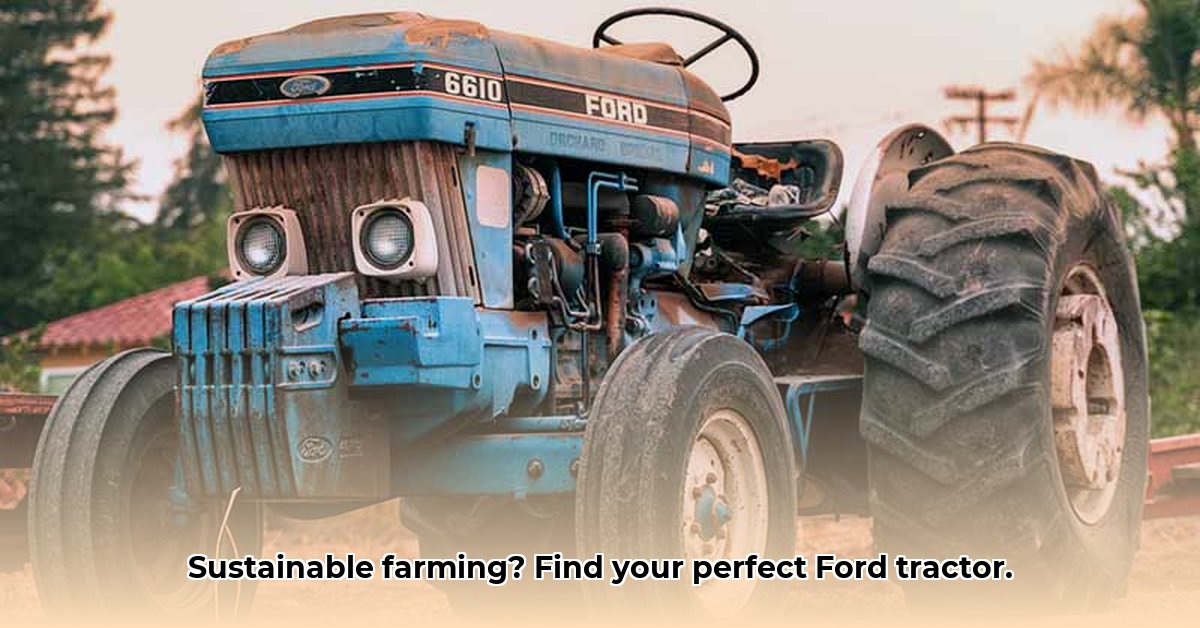
Ford Compact Tractors and Sustainable Farming
Finding the right used Ford compact tractor can be a strategic move for sustainable and budget-conscious farming. These tractors offer a balance of affordability and practicality, but careful planning and due diligence are crucial. This guide provides a step-by-step approach to help you choose the right used Ford tractor, emphasizing sustainable practices and mitigating potential risks. For detailed model specs, check out this helpful resource.
Market Overview: Assessing the Used Ford Compact Tractor Market
Used Ford compact tractors show widespread availability. Online marketplaces like TractorHouse and local dealerships offer a diverse selection, spanning various models, ages, and price points. However, detailed model-specific information and condition assessments can vary, requiring thorough research. Factors like horsepower, age, and included implements significantly influence both price and suitability for your specific farming operation. Do you need a smaller tractor for smaller plots, or a more powerful machine for larger acreage or heavy-duty work? Clarifying your needs simplifies the search process. For example, a farmer with 20 acres might prioritize a different model than a farmer with 100 acres.
Advantages and Disadvantages of Used Ford Compact Tractors
The decision to purchase a used Ford compact tractor requires carefully weighing the benefits against potential drawbacks. While cost-effectiveness is a major advantage, maintenance considerations are paramount.
Advantages:
- Affordability: Used Ford compact tractors are significantly cheaper than new models, making sustainable farming more accessible to those with tighter budgets. This lower initial investment allows for a faster return on investment and reduces financial barriers to entry for new farmers.
- Wide Selection: The used market offers a wide variety of models and ages, enabling farmers to find tractors best suited to their needs and preferences. This versatility accommodates diverse farming operations and acreage sizes.
- Simpler Mechanics (Potentially): Older Ford compact tractors may have simpler mechanical systems than newer models, potentially simplifying repairs and reducing maintenance costs. However, this simplicity is often offset by the potential challenges of parts sourcing and the age-related wear often found in older tractors.
Disadvantages:
- Maintenance: Older tractors require more frequent maintenance and repairs than newer models, leading to increased operational costs and potential downtime. The availability and cost of replacement parts for older models can also be challenging.
- Fuel Efficiency: Older models may have lower fuel efficiency compared to modern tractors, resulting in higher operating costs and a larger carbon footprint. This increased fuel consumption can impact the overall sustainability of the operation.
- Emissions: Older engines tend to produce higher emissions than newer models, raising environmental concerns. The increase in greenhouse gas emissions reduces the environmentally friendly aspects of a farming operation..
Choosing the Right Ford Compact Tractor: A Practical Guide
Buying a used tractor is a substantial investment. Following these steps significantly improves the likelihood of a successful and sustainable purchase:
Step 1: Define Your Needs: Before searching, carefully assess your farm's operational requirements. What tasks will the tractor perform? What is your acreage? Establishing a clear understanding avoids purchasing a tractor unsuitable for the intended work.
Step 2: Research Tractor Models: Research suitable Ford compact tractor models based on your needs. Consider horsepower requirements for different tasks and land sizes, as well as the age of the tractors, which directly impacts maintenance needs and reliability. The availability of parts is also a key factor to consider in this research phase.
Step 3: Pre-Purchase Inspection: A thorough visual and mechanical inspection is crucial. Check for engine leaks, unusual noises, examine the transmission, hydraulics, tires, and all critical components for wear and tear, and look for signs of past damage.
Step 4: Seek Expert Advice: A pre-purchase inspection by a qualified mechanic is strongly recommended. This professional assessment identifies potential issues that could easily be overlooked. The value of preventative maintenance and addressing potential mechanical problems before purchase becomes exceptionally valuable.
Step 5: Test Drive: Test drive the tractor under varying conditions to assess its performance and identify any problems. Operating the tractor under load will reveal hidden issues not apparent during a static inspection.
Step 6: Price Negotiation: Thoroughly research the market price of comparable tractors and negotiate the price accordingly. Don't hesitate to walk away if the price is not considered fair or reasonable.
Step 7: Paperwork Review: Before finalizing the sale, meticulously review all paperwork to ensure the title, registration, and maintenance records are complete and accurate.
Sustainable Practices with Your Used Ford Tractor
Minimizing environmental impact is critical to sustainable farming. Even with an older tractor, you can employ eco-friendly strategies:
Fuel-Efficient Operation: Regular maintenance—oil changes, filter replacements—is essential for maximizing fuel efficiency. Avoid unnecessary idling, and use the appropriate gear for specific tasks.
Preventative Maintenance: Regular maintenance not only keeps the tractor running smoothly but also significantly reduces emissions and extends its lifespan. This reduction in the tractor's environmental impact adds to the sustainability of the farm's operation.
Upgrade Considerations (Where Feasible): Explore cost-effective upgrades that could enhance fuel efficiency or reduce emissions. This may be as simple as installing new emission control systems or might involve more extensive upgrades to the engine. A careful cost-benefit analysis is vital.
Policy and Regulatory Considerations
Farmers must adhere to all relevant local, state, and federal regulations regarding emissions, safety, and noise pollution for older agricultural machinery. Contact your local agricultural extension office or relevant government agencies for specific, up-to-date regulatory information applicable to your area.
Conclusion: Making Informed Choices for Sustainable Farming
Used Ford compact tractors offer a sustainable and affordable entry point into farming. While potential challenges require careful consideration, the cost-effectiveness and wide availability of these tractors make them an attractive solution. By following this guide and prioritizing thorough due diligence, farmers can effectively acquire and maintain older tractors, seamlessly integrating them into sustainable farming practices. Remember, informed decision-making is critical to long-term success and responsible environmental stewardship.
Resources
(Include links to relevant government websites, agricultural extension services, and reputable online marketplaces for used farm equipment.)